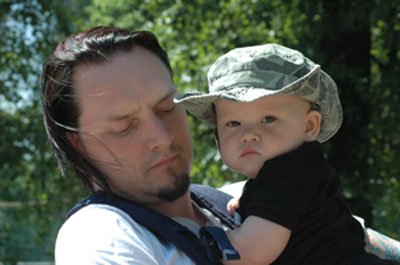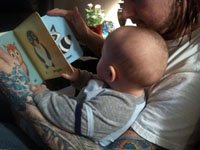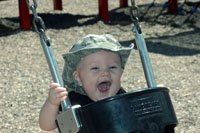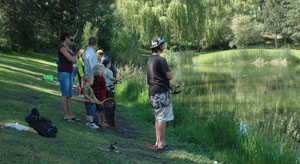How Do Family Behavior Patterns Affect Us?
Why Do We Continue Them ( Even Though)?

Our Context
Our family behavior patterns dictate how we deal with life. They determine our opinions and our beliefs and hence our decisions. This is called our context. These family patterns of behavior are at the route of our self-esteem. Family behavior patterns are passed down through generations. What worked back then may not work today. What we believe about life, and our presence in this life effects how we feel about ourselves.
All of our relationships are completely affected by our context about life. This includes our relationships outside of our families. How we attract people into our lives is the result of our context.
I mentioned on the couples page that we are attracted to people in our lives because they demonstrate the same family behavior patterns as our early caregivers or they fill a void in our life left from our childhood. We recognize each other on an unconscious level. Have you ever said or heard someone say that they married their mother or father? Not literally, but we often marry someone who has the same beliefs and behaviors that we are used to. No matter how dysfunctional it may be, we don’t notice it, because we think it is normal. We haven’t experienced anything different. If it is behavior that is not effective, it may become a real problem at some time in the future. And when it does, we will leave that relationship and move on. If we don’t become aware of why the relationship failed and admit to our part in it, we will repeat it again with a different person.
I believe that mental illness can be avoided if we look at ourselves and examine our lives. That is not always easy. We create fantasies to protect us from things that we don’t like and don’t want to face. This puts up a big wall between what is real and what is not.
How hard it seems to be for us to ask ourselves the question: what works in my life and what doesn’t? Do I have the life that I want? Am I happy and fulfilled? What am I afraid of?
Within our family is where we learn, grow and evolve.
Let's not under any circumstances get the idea that our family behavior patterns are wrong or bad. We learned them fair and square. Even if they don't work so well, they were given to us and we have a right to them.
What do we learn about life if we have no challenges and conflicts? I have a friend that says that if he lived alone, he wouldn't know if he was in a bad mood. We need each other to bounce off. Communication is one of the most important skills that we can acquire. So we need to communicate.
What we need to do, though, is recognize our own needs and honor them within our relationships. When we stop being afraid to tell the truth and to stand up for ourselves, we will learn to deal with conflict at it's source and open up a world of truth, and of freedom from fantasies and untruths with each other.
Did you know that it is not your responsibility to make sure that things work well for the people around you? It is your responsibility to be the best person you can be and to hold the people in your life able to deal with their own reactions to what happens to them. We are robbing people of the ability to develop valuable learning skills if we take their coping abilities away from them. And in turn, we make ourselves crazy!
( This does not mean, of course, that we allow abuse to children who are incapable of defending themselves. This is a whole other story)
"There is no right and there is no wrong, there is what works and what doesn't. We can always change what doesn't work."JR

How Belief Systems Can Create Bad Family Behavior Patterns
Last weekend I saw a family in turmoil. The boys are 3 and 5 years old. The parents are loving and caring. Their life is chaos!
The children cannot be in the same room with each other without someone getting hurt or something getting broken. The parents are reactive and loud. The children cry often and are sent away to their rooms regularly. The boys don’t want to fight. They don’t want to break things and they don’t want to be sent away. They want to be validated, supported and embraced. What is wrong? What belief systems have caused this pattern of behavior?
Parenthood is challenging. Anyone can be a parent. It doesn’t take a university education, diploma or a permit. We all know what it takes. And sometimes, it happens in the blink of an eye. What next?
This beautiful child enters the world in love with, and open to everything. He has a clean mind and an open heart. He is like a sponge. How we, as caregivers, behave towards that child, and towards each other, forms the basis of his belief systems and hence his self-esteem. It is not what we say but what we do that forms these beliefs. You have heard the saying “ actions speak louder than words”. It is so true.
Now back to the loving parents who are beside themselves with the chaos in their relationship with their children. When two people come together to form a family, they each have been brought up differently to some extent. We do, however, have a tendency to attract people into our lives who display similar behavior patterns to what we are used to. I believe that these parents were brought up in an environment where control was a large factor. In fact, in general, parents feel that control is an important factor in child rearing. When children behave badly, it is a reflection on the parent.
The need for control for these parents has caused power struggles that dominate their lives. These behavior patterns have been passed on from previous generations and will be perpetuated if unchecked.

Here is a website by the world leader in personal development since 1960. Earl Nightingale has share his secrets to success with millions of people for over 50 years. Click here ...
Here are nine tips to explore in helping you to eliminate the stress around your family and some techniques to bring serenity and peace in your home. I suggest that you first look at your beliefs around being a parent and find out what is not working. Remember that self-esteem is the most important thing that you can help your child to develop.
1. Children are not adults. Parents want their children to think and behave like adults, which they cannot do.
2. Children need to be involved in creating harmony in their lives. They need to be part of a plan that everyone works together on.
3. Let go of the need to control them. Controlling another person never works for the good of anyone. Even though children are young and inexperienced, they are still equal human beings. Their self-esteem suffers, if they have no choice.
4. Sometimes when children are too young to understand, distracting them is more useful than emphasizing their behavior.
5. Stop the knee-jerk reactions. Count 5 seconds before responding to an unfortunate event with your children. Then you are in a position to figure out what happened and what works best.
6. Try to avoid rewarding good behavior. It assumes that they are inherently bad. Encourage and approve of their accomplishments.
7. When they fight, tell them you love them and it hurts you to see them treating one another badly.
8. As parents, you need to both be on the same page. You need to be consistent with how you deal with your children.
9. Read the book “ Children the Challenge” by Rudolf Dreikurs. It is the best book I have ever read about bringing up children. It is based on natural and logical consequences. It is intelligent. I love it, and when I used it with my children it became fun!
Here is an article by a new contributor to our website. Thank-you Stephanie.
Family Behaviors: Where They Can Begin~~by Stephanie Jackson
We have a grandson who’s mother is suffering from complex post traumatic stress syndrome CPTSD. She and her sister were abused as children. She does not trust anyone, ever. At one point in our relationship when she was pregnant with our grandson, she presented us with information about her condition and mentioned that she wanted us all to be on the same page. That was very encouraging and I went about researching the condition so that I could be of help.
Edward is nine months old now, and his mother has completely forgotten about her condition and is punishing the father, my son, on a regular and daily basis. He is not the one!
He was never able to live with her, as planned, but Mathew insists on seeing his son on a regular basis. We are in the picture a lot since they can no longer have contact with each other. It has become a challenge to get Edward from his mother to his father without any contact between the two. Friends have stepped up to help and each and every one of them as well as his doting grandparents have had to deal with her abuse.
How this all has to do with family behavior patterns is the reaction and mood of Edward as he travels back and forth. Children are sponges. They learn from how we behave towards each other and towards them. What we say to them is not as important at this early stage. But how we are makes a huge impact.
Edwards’ mother doesn’t trust the world. She has problems with clerks in the grocery store, secretaries at her doctors office, facilitators at the recreation centre and any number of people that make up her circle of acquaintances. She protects Edward from noise, water in his ears, being alone at night (he still does not sleep alone), crowds and any number of things that to her are threatening. How is that going to impact his life?
The good news is that children are resilient. My naturopath said that a child fairs well if he has at least one of his parents positive and aware of the importance of his self-esteem. He will fair even better if he has more people who play a significant roll in his up-bringing that also are positive and aware. We are those people.
On the days that he goes more than one day without seeing his father, he comes back quiet and subdued. He is happy to see his dad but it takes a little time before he becomes animated and playful. We had the good fortune of spending two days in a row with him, and on the second day he was boisterous, playful and vocal. It was one of his best days ever. It will be a constant challenge but one that we are all prepared to take on. Edward will be our teacher as well as our student.
I know that many people have found themselves in a situation similar to this where the child is often inadvertently used as a weapon against the other parent. Here are a few tips to remember that will help your child to grow up healthier.
1. Remember that the first and most important thing that you can help your child to develop is his or her self-esteem. It is the most important element for the rest of his life. He needs to know he is valuable and special.
2. Your feelings for the other parent must not be transferred to the child. Children should not be asked to make a choice between parents. Never refer negatively to the other parent.
3. This could be a time for personal growth, as you need to accept the other person for who they are and accept what is in the scheme of things. You know that we can’t change another, no matter how we lament.
4. Remember that a child can read your energy and will feel it. When things don’t go right in a family, the child will always think that it is something that they have done wrong. Don’t let that happen.
5. Stay happy yourself. We need the people in our lives who love us and respect us. Treat those relationships like gold and teach your children to do the same.

Family Behavior Patterns and Parenting Styles.
Family behavior patterns are carried on from generation to generation and, usually, they are not consciously examined for effectiveness and workability. Within family behavior patterns exists parenting styles.
There are three styles of parenting: autonomous, democratic and permissive. Autonomous is high order and low freedom. Democratic is order and freedom. Permissive is high freedom/little order.
I firmly believe in the democratic style. It is the one style that takes into account the crucial importance of a child’s self-esteem. It is the one style that teaches a child that the world is a safe place and the people in his life accept him and love him for who he is. This is how he can accept and love himself unconditionally. A child needs to grow up being secure and strong and valuable. He needs to feel that he belongs in the world, that he has lots to contribute and that he is appreciated. This is the core of his self-esteem. To me it is logical that teaching democracy to a child is the best favor we can do for him or her.

I have two sons and at an early age their father died and I became their only caregiver. I had a lot of problems at first and so began to study books about child rearing so that I could find the best way to take care of them. I found a system called ‘Children the Challenge’ that made a lot of sense to me and it became my own parenting style. It is based on logical and natural consequences and it changed my life in more ways than I could imagine. It is not just a parenting style, it is a way to live.

I have the great pleasure today of experiencing two of my grandchildren growing up in the formative years of their life. The first one is being brought up from a background of control and dominance. The other is from a democratic style with a little permissiveness. The first one, William, is an adopted grandchild and so it is easy for me to recognize the behavior patterns (because they are not natural to me). The second one, Robert, is my son’s child, and his parenting style is natural to me.
Just having the styles of child rearing are not enough, though. Consistency is the second most important component of interacting with your child. Consistency between what you say and what you do is crucial. Children become confused and fractured if they cannot count on you doing what you say you will.
William is being treated in a controlling way. It is not consistent, though. He doesn’t know what to expect at times. Mood plays an important role in how those parents will behave at any given time. There are days when he is told to go to the corner or go to his room so many times that everyone is exhausted. Then there are days when the entire day is spent cuddling him in front of the TV. I think that it is a form of apology as well as an easy way to avoid conflict. The days cuddling in front of the TV are definitely preferable, but the inconsistency takes away from the value of the time.
Robert and his parents are having more fun in their life because he is allowed to think about the consequences of his actions as it is brought to his attention and he gets to figure out what they are. He only knows what fairness is and so doesn’t have to be on his guard. When a child has broken a house rule and ends up feeling good about the whole learning experience, you know that you have done something right.
I have no personal experience with permissive parenting, but I do know that a child from that background has no boundaries and ends up being the least popular in a group situation. I child brought up in a permissive family is short on social skills and has difficulty working with others in a cooperative way. Values are hard to instill in a permissive family as no one seems to care what you do. It’s a great subject for a movie script ( Pippy Longstockings) but doesn’t work well in the real world.

If your household is tense and on edge, ask yourself a few questions about how your own family behavior affected you. Is this what you want for your own family. What can you do differently to help your children grow up with a healthy self-esteem?

What is a dysfunctional family?
A dysfunctional family is one where all members co-operate to create conflict, misbehavior and often abuse. Some members are the perpetrators while others are enablers. As well, some may accommodate the others in order to administer damage control. All of this behavior is done on an unconscious level. No one is happy and no one knows why.
Dysfunction is a product of family behavior patterns. These patterns are passed on from generation to generation and often go unchecked. The reason for this is that children grow up within the environment, don’t know anything different and believe that this is normal. Unless the parents and grandparents come to the realization that this is unacceptable and not normal, they will not change it. So the legacy is passed on.
One aspect of this scenario is the Law of Attraction. As we grow up and make new relationships, we attract people into our lives that mirror the behavior we are most familiar with. You have probably heard the saying ‘like attracts like’. We see it everyday. People leave a bad relationship only to end up in another. Sometimes one or more members of the family are eventually able to look objectively at the pattern and make different choices.
There are many factors that prevent change from taking place. It is human nature to avoid change. And we always want to be right. We spend an awful lot of time in denial before we start to see more clearly. There is always fear involved with change and there is also reluctance to admit to our selves and others that what we are doing is not working for anyone. Usually, in order to admit to ourselves that change is necessary, we have to be in great pain physically, emotionally or mentally (often all three). It usually takes a crisis to make us look at our circumstances. We fear change because we are afraid of the unknown.
I believe that this fear comes from our own insecurities. Self-esteem is at the core of all of our actions. As human beings, our biggest need is to feel good about ourselves. It is our intrinsic need and right, as people on this planet and in this Universe, to feel good about our selves. When that is missing, we are continually finding ways to compensate for that void. Hence, the origin of dysfunctional behavior… passed down and adapted.
Here are a few things I know for sure about family behavior patterns:
• It’s not our fault.
• Most families are dysfunctional to some degree.
• We are all created equal and perfect.
• Things only have the meaning that we give them. We can change our minds any time we want.
• Guilt has no place in the healing process.
• Our family is where we learn the most about ourselves.
• We are all valued in this world.
• Forgiveness is the salve that heals.

Aspergers and Family Behavior Patterns
My husband's youngest son offered to have us stay with him for a while. We were in the middle of making changes in our life and it was a welcome invitation. He said that he needed our help with his girlfriend and their three year old little boy. We assumed that it was his way of making it all right for us to live there with them. We were to discover early on in our relationship that he really did need our help and that there were problems in their home.
The little boy was explosive and demonstrated unusual behavior. His father was often at wits end to know how to deal with him and their life was in turmoil a lot of the time. The boy's mother was an element that was unpredicted. She would not support Bill in his handling of little Brian and so it became more difficult.
At the end of a very traumatic episode between little Brian and his parents, I began to do research using all of the behaviors of Brian as key words. After much reading and surfing the internet, I came up with Asperger's Syndrome. It is a form of autism but usually people who have it are extremely high functioning. I printed out a sheet of 25 behaviors that are present in an Asperger person and Brian had every one of them. My husband and I decided to take a chance and give the information to Bill. I will mention here that his girlfriend, Saki had traveled, pregnant, with him from Japan and had not yet learned to speak fluent English. So any relationship we had with her was through our son. They both were upset and Saki refused to believe that Brian was autistic. He was too high functioning for that.
That was the end of any conversation on that subject and on any subject, for that matter for a while. The tantrums continued and we confined ourselves to the room in the basement where we slept. We loved that little boy and were so very surprised when he refused to be our friend. I continued to do research on the subject and discovered more and more and read many blogs and websites written by people who had the disability and parents of children with it and how they had all adapted to it.
It came to a head again when Brian started to go to pre-school three mornings a week. The school was quick to notice his anti-social behavior, and were eager to help. He has now been evaluated and will be observed and steps will be taken to start a training program for him.
Now that our attention is off Brian, we have noticed that Saki has many phobias and obsessive-compulsive behaviors. She spends her time avoiding us and is continually saving and hiding things that would normally be recycled. She spends a large amount of time on the computer finding bargains for 'stuff' that no one needs. She still insists on shopping for them, though. She hides food and is at a loss when Brian is in school. She spends hours pulling her hair out one by one. I would say that she too, has a form of autism.
My question here is, what part of Brian's behavior patterns are his Asperger's Syndrome and what part of his behavior is learned from his mother. They have been inseparable since his birth. She has spent his every waking minute with him. Most of us know that is it not what we say to our children so much as 'how we are' with them, and with others, that teaches them about life. This theory may give others food for thought.
I would like to mention that Asperger's is not a hopeless thing. Knowledge takes away the fear. It is a different way of thinking for some people but the brain can be taught new things. I have seen a remarkable difference in Brian in the last month.
Now, the only challenge for my family is getting Bill as well as Saki to realize that Saki may have the same thing. It seems that autism is hereditary and can be passed directly on to our children.
I believe we have done our part in helping this family.It is impossible to change other people. We can only be the best we can be and offer information where appropriate. The outcome is not up to us.

Here is a great website about Aspergers from a women with two children who have it" onclick="return FIX.track(this);">Here is a great website about Aspergers from a women with two children who have it
Return from Family Behavior Patterns to Home Page
Return from Family Behavior Patterns to Families Self-Esteem








